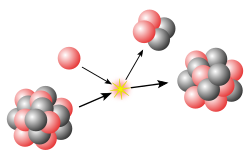
Back انبعاث النيوترون Arabic Emissió de neutrons Catalan Vyzáření neutronu Czech Neutronemission Danish Neutronenemission German Emisión de neutrones Spanish گسیل نوترون Persian Neutroniemissio Finnish Émission de neutron French Neutroonenemisjuun FRR
This article relies largely or entirely on a single source. (March 2016) |
| Nuclear physics |
|---|
 |
Neutron emission is a mode of radioactive decay in which one or more neutrons are ejected from a nucleus.[1] It occurs in the most neutron-rich/proton-deficient nuclides, and also from excited states of other nuclides as in photoneutron emission and beta-delayed neutron emission. As only a neutron is lost by this process the number of protons remains unchanged, and an atom does not become an atom of a different element, but a different isotope of the same element.[2]
Neutrons are also produced in the spontaneous and induced fission of certain heavy nuclides.
- ^ Guinn, Vincent P. (2003), "Radioactivity", Encyclopedia of Physical Science and Technology, Elsevier, pp. 661–674, doi:10.1016/B0-12-227410-5/00643-8, ISBN 978-0-12-227410-7, retrieved 2025-04-26
- ^ "What is radiation?". www.arpansa.gov.au/.
{{cite web}}: CS1 maint: url-status (link)
© MMXXIII Rich X Search. We shall prevail. All rights reserved. Rich X Search